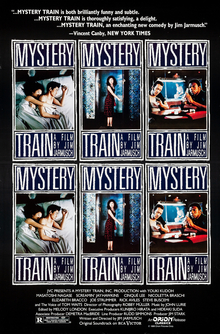
Back Mystery Train Catalan Tajuplný vlak Czech Mystery Train German Mystery Train Spanish قطار مرموز Persian Mystery Train (elokuva) Finnish Mystery Train (film) French Mystery Train Irish Mystery Train - Martedì notte a Memphis Italian ミステリー・トレイン Japanese
| Mystery Train | |
|---|---|
 Theatrical release poster | |
| Directed by | Jim Jarmusch |
| Written by | Jim Jarmusch |
| Produced by | Jim Stark |
| Starring | |
| Cinematography | Robby Müller |
| Edited by | Melody London |
| Music by | John Lurie |
Production companies |
|
| Distributed by | Orion Classics (United States) |
Release dates | |
Running time | 113 minutes |
| Countries |
|
| Languages |
|
| Budget | $2.8 million[2] |
| Box office | $1.5 million (domestic)[1] |
Mystery Train is a 1989 comedy-drama anthology film written and directed by Jim Jarmusch and set in Memphis, Tennessee. The film is a triptych of stories involving foreign protagonists, unfolding over the course of the same night. "Far from Yokohama" features a Japanese couple (Youki Kudoh and Masatoshi Nagase) on a cultural pilgrimage, "A Ghost" focuses on an Italian widow (Nicoletta Braschi) stranded in the city overnight, and "Lost in Space" follows the misadventures of a newly single and unemployed Englishman (Joe Strummer) and his reluctant companions (Rick Aviles and Steve Buscemi). The narratives are linked by a run-down flophouse overseen by a night clerk (Screamin' Jay Hawkins) and his disheveled bellboy (Cinqué Lee), the use of Elvis Presley's song "Blue Moon",[3] and a gunshot.
The starting point for the script was the ensemble cast of friends and previous collaborators Jarmusch had conceived characters for, while the tripartite formal structure of the film was inspired by his study of literary forms. Cinematographer Robby Müller and musician John Lurie were among the many contributors who had been involved in earlier Jarmusch projects and returned to work on the film. Mystery Train's US$2.8 million budget (financed by Japanese conglomerate JVC) was considerable compared to what the director had enjoyed before, and allowed him the freedom to rehearse many unscripted background scenes. It was the first of Jarmusch's feature films since Permanent Vacation to depart from his trademark black-and-white photography, though the use of color was tightly controlled to conform with the director's intuitive sense of the film's aesthetic.[according to whom?]
Mystery Train was released theatrically by Orion Classics under a restricted rating in the United States, where it grossed over $1.5 million. It enjoyed critical acclaim on the film festival circuit, and like the director's earlier films premiered at the New York Film Festival and was shown in competition at Cannes, where Jarmusch was awarded the Best Artistic Achievement Award. The film was also shown in the Edinburgh, London, Midnight Sun, Telluride, and Toronto film festivals, and was nominated in six categories at the Independent Spirit Awards. Critical reaction was overwhelmingly positive, with reviewers praising the structure, humor, and characters of the film, though there was criticism that the director had not been sufficiently adventurous.